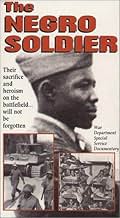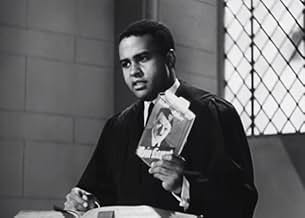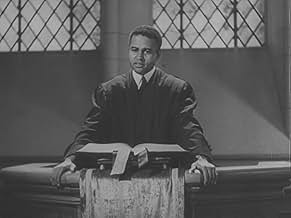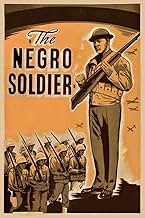Documentary focusing on the contributions to the American war effort of African-American soldiers.Documentary focusing on the contributions to the American war effort of African-American soldiers.Documentary focusing on the contributions to the American war effort of African-American soldiers.
- Awards
- 2 wins total
Max Schmeling
- Self
- (archive footage)
Henry Johnson
- Self - WW1 Soldier
- (archive footage)
George Washington Carver
- Self - Chemist of Agriculture
- (archive footage)
James S. Watson
- Self - Elected Judge in New York City Courts
- (archive footage)
- (as Elected Judge in New York City Courts)
Matthew Henson
- Self - Explorer
- (archive footage)
- (as Explorer)
Vivien Theodore Thomas
- Self - Leading New York City Surgeon
- (archive footage)
- (as Leading New York City Surgeon)
W.C. Handy
- Self - Father of the Blues
- (archive footage)
- (as Father of the Blues)
C.B. Powell
- Self - Financier and Publisher
- (archive footage)
- (as Financier and Publisher)
Gertrude Elise Ayer
- Self - Principal of a New York City Public School
- (archive footage)
- (as Principal of a New York City Public School)
Lawrence Reddick
- Self - Curator, Schomburg Collection of Literature
- (archive footage)
- (as Curator)
Richmond Barthé
- Self - International Prize Winning Sculptor
- (archive footage)
- (as International Prize Winning Sculptor)
Marian Anderson
- Self - Singer
- (archive footage)
- (as Singer)
Jesse Owens
- Self - Sprinter at the 1936 Summer Olympics Final
- (archive footage)
- (as Owens)
Erich Borchmeyer
- Self - Sprinter at the 1936 Summer Olympics Final
- (archive footage)
- (as Borchmeyer)
Ralph Metcalfe
- Self - Sprinter at the 1936 Summer Olympics Final
- (archive footage)
- (as Metcalfe)
Martinus Osendarp
- Self - Sprinter at the 1936 Summer Olympics Final
- (archive footage)
- (as Osendarp)
Gustav Weinkötz
- Self - High Jumper at the 1936 Summer Olympics Final
- (archive footage)
- (as Weinkötz)
- Director
- Writer
- All cast & crew
- Production, box office & more at IMDbPro
Featured reviews
As all "good" propaganda this also is telling the truth. Well part of it at least. Omissing crucial other things that may not serve the purpose the movie/documentary had in mind. Because this was about recruiting people of color to the military. So you know, they only tell the people the good stuff, not the things that were still dividing America. It's almost tragic, but some of the things dividing are still very apparent (especially with number 45 in power).
You may say, why go to current politics? The question should not be raised, because while there is no commentary at hand (at least not with Netflix), this is a testament to a part of history some like to forget. And how devious methods were applied to benefit an army, pretending to be more than it was ...
You may say, why go to current politics? The question should not be raised, because while there is no commentary at hand (at least not with Netflix), this is a testament to a part of history some like to forget. And how devious methods were applied to benefit an army, pretending to be more than it was ...
The US was recruiting more and more black people as soldiers as WW2 came to a close. Eventually 125,000 would serve overseas and nearly 1000 would die in combat, but in 1943 the big question was how to motivate blacks to fight for an America in which segregation was still very much alive.
Carlton Moss was serving as an adviser to the War Department and the job was given to him to write the documentary, and eventually he ended up starring as a Minister.
Moss decided to focus on the contribution of blacks in American history, particularly their role in battles as well as their achievements in science, medicine, and education. He contrasts that with the Axis views about "colored people" and their treatment of conquered peoples. The film switches tones and then follows the life of a new enlistee who eventually makes it to officer candidate school.
The documentary is very clever, telling the truth, but just enough of the truth to avoid some of the awful elements of life for black people in the U.S.
Carlton Moss was serving as an adviser to the War Department and the job was given to him to write the documentary, and eventually he ended up starring as a Minister.
Moss decided to focus on the contribution of blacks in American history, particularly their role in battles as well as their achievements in science, medicine, and education. He contrasts that with the Axis views about "colored people" and their treatment of conquered peoples. The film switches tones and then follows the life of a new enlistee who eventually makes it to officer candidate school.
The documentary is very clever, telling the truth, but just enough of the truth to avoid some of the awful elements of life for black people in the U.S.
8sbox
This is a good patriotic documentary which focuses on blacks' role in World War II. Made in 1944, this film includes many interesting scenes, from training to actual service.
This production was made in partnership with the then called Department of War. The goal of this film was to recruit African-Americans to join the war effort in WWII. The film tries to convince blacks that the U.S. has always had an amicable relationship with them. The film offers happy imagery of blacks building log cabins beside the early settlers and working pleasantly beside whites in factories. However, never does the film try to explain or apologize for slavery. The film also suggests that blacks have always had the same opportunities as whites. In this film, slavery, lynchings and inequality are simply erased. For this reason, this film is a true treasure for the propaganda film archive.
Documentary focusing on the contributions to the American war effort of African-American soldiers.
The film was produced by Frank Capra as a follow up to his successful film series "Why We Fight". The army used this film as propaganda to convince Black Americans to enlist in the army and fight in the war. Most people regarded the film very highly, some going as far as to say that "The Negro Soldier" was "one of the finest things that ever happened to America".
In different movies during this time period, African Americans were often portrayed as humorous characters. However, after "The Negro Soldier", African Americans played more respectable and prominent roles in films. I don't know if this film is directly connected to the new way these men were shown in film. I can acknowledge there was definitely a post-war shift. And it might be as simple as saying that white men and black men fought together, making them more unified in the 1940s... but that would disregard the role that minorities had in earlier wars.
The film was produced by Frank Capra as a follow up to his successful film series "Why We Fight". The army used this film as propaganda to convince Black Americans to enlist in the army and fight in the war. Most people regarded the film very highly, some going as far as to say that "The Negro Soldier" was "one of the finest things that ever happened to America".
In different movies during this time period, African Americans were often portrayed as humorous characters. However, after "The Negro Soldier", African Americans played more respectable and prominent roles in films. I don't know if this film is directly connected to the new way these men were shown in film. I can acknowledge there was definitely a post-war shift. And it might be as simple as saying that white men and black men fought together, making them more unified in the 1940s... but that would disregard the role that minorities had in earlier wars.
Did you know
- TriviaIn 2011, the film was selected for preservation in the National Film Registry by the Library of Congress with the following statement: "'The Negro Soldier' showcased the contributions of blacks to American society and their heroism in the nation's wars, portraying them in a dignified, realistic, and far less stereotypical manner than they had been depicted in previous Hollywood films."
- Alternate versionsAccording to government documents, a two-reel shortened version of the film was released in July 1944.
- ConnectionsEdited from America (1924)
Details
- Release date
- Country of origin
- Language
- Also known as
- The Negro Soldier in World War II
- Production companies
- See more company credits at IMDbPro
Box office
- Budget
- $78,254 (estimated)
- Runtime
- 43m
- Color
- Sound mix
- Aspect ratio
- 1.37 : 1
Contribute to this page
Suggest an edit or add missing content






























